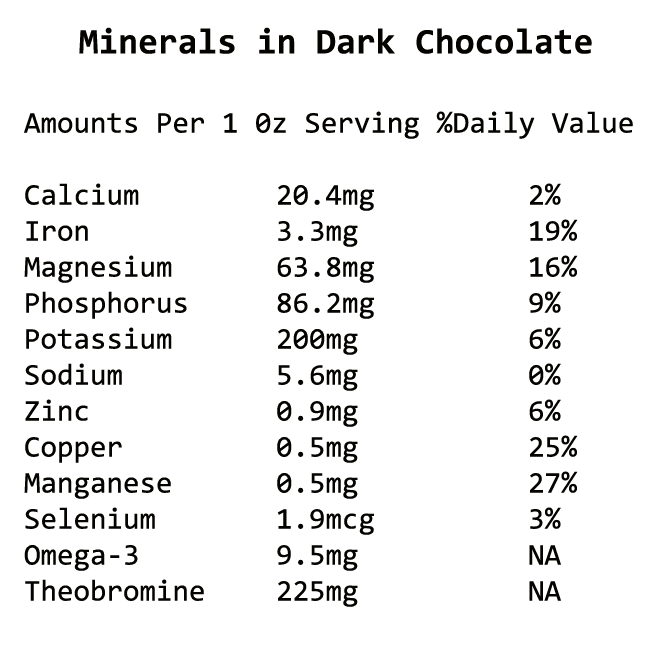Have I mentioned before that I love chocolate? My posts recently have included a lot of chocolate recipes, like this one for chocolate bars and this one for hot fudge sauce with chocolate ice cream. As much as I love chocolate though, I’ve found that there’s more to my cravings than a simple desire for choclatey goodness

Hand The Chocolate Over and No One Gets Hurt
Chocolate is high in magnesium, a mineral that is highly essential to body functions. There are also many other health benefits of dark chocolate. Just one ounce delivers high amounts of magnesium, copper and manganese. When our bodies are lacking in vitamins and minerals, we crave what we need. Our bodies are smart and recognize where they receive certain minerals, then tell our brains to eat those foods.
Ever wonder why you crave chocolate when stressed? Many animal trials have shown that stress triggers chocolate cravings. According to a 1997 article in Neurochemistry International, magnesium is considered to be an essential element for the pleasure neurotransmitter dopamine in the body.
It is possible that low levels of magnesium trigger low levels in dopamine in the brain, possibly triggering desires for chocolate as a biological attempt to increase dopamine Carol Simontacchi, CCN, MS
But back to magnesium. Since chocolate is so high in magnesium and your body recognizes it as a source of magnesium and a way to increase dopamine levels, cravings occur when the body is deficient in these substances. Clinicians have noted that chocolate cravings disappear once magnesium levels are restored in the body.
 |
| nutritiondata.self.com |
So Why is It So Important?
Bone Health
Calcium is the star of the show when it comes to bone health, but without magnesium bones are lacking in density and become brittle. The Journal of the American Geriatrics Society found that participants in a bone mineral density study were at a higher risk for decreased bone health when magnesium intake was insufficient. This can cause osteoporosis and an increased risk for fractures and other bone damage.
“The average person’s body contains about 25 grams of magnesium, and about half of that is in the bones. Magnesium is important in more than 300 chemical reactions that keep the body working properly.” Web MD
Decreased Risk of Diabetes
Magnesium helps maintain tissue sensitivity to insulin, as well as regulate insulin in the body. The American Diabetic Association’s publication, Diabetes Care, conducted a study between obese children and healthy children to examine the role magnesium plays in insulin production.
Insulin resistance is the number one precursor to diabetes. And the number of children developing diabetes has drastically risen in the past few years. Adult studies have shown that magnesium is a vital nutrient for insulin regulation and production, and glucose tolerance. The lack of magnesium puts adults at a much higher risk for diabetes.
Even scarier though is that this lack of magnesium plays a role in pediatric diabetes. Researchers concluded that,
“The association between magnesium deficiency and IR (insulin resistance) present during childhood. Serum magnesium deficiency in obese children may be secondary to decreased dietary magnesium intake. Magnesium supplementation or increased intake of magnesium-rich foods may be an important tool in the prevention of type 2 diabetes in obese children.
If you are already a diabetic, then magnesium is just as important to help maintain healthy insulin levels. In 2007 a pharmaceutical journal found that retinopathy;”>thy (eye disease), nephropathy (kidney disease), neuropathy (nerve disease), and foot ulcerations in diabetics were more prevalent in magnesium deficient individuals.
A Healthy Immune System
The science journal Nature published a study that found magnesium is an essential component of a healthy immune system. Magnesium binds to enzymes and nucleic acids and is essential for their activity. It emerges that this ion can also function as a signalling molecule with a crucial role in the immune system.
Immunology: Magnesium in a Signalling Role. In another study, 37 children with asthma ages 7-19 were divided into two groups. One group was given 300 mg daily of a magnesium supplement, the other a placebo. The magnesium supplemented group had fewer asthma related skin reactions and needed to use their inhalers less. (source)
Interestingly chocolate is high in theobromine, an alkaloid substance that reduces blood pressure and as a bronchiodilator (a substance that opens up the throat), has been used with moderate success for treating asthma.
There are too many uses for magnesium in the body to mention all of them, but hopefully this sheds some light on how vital it is to the prevention and treatment of certain issues
Signs of Magnesium Deficiency
How do you know then if you’re deficient in magnesium? The majority of Americans are NOT getting the 400 mg of their recommended daily magnesium through food (source). Unfortunately most of the nutrition in our soil has been depleted, so even if you’re eating all the right foods, you may be magnesium deficient.
Severe deficiency symptoms are rare in the US and include loss of appetite, nausea, vomiting and faintness. More common symptoms though often go unnoticed
- Migraines. Those without aura (vision problems) were successfully lessened with magnesium citrate, an easily absorbed form of magnesium in the body.
- Chocolate cravings. Chocolate is high in magnesium, as discussed above.
- Body Odor. Bad underarm and stool odor are often caused by magnesium deficiencies. Magnesium modifies the intestinal flora which are responsible for proper absorption of nutrients and waste elimination. To combat this, use a deodorant with magnesium oil in it or a magnesium lotion.
- Constipation. Foods rich in fiber are also typically high in magnesium and both help to maintain proper excretion. A 2008 study in the Journal of Paediatrics and Child Health reported that the increasing constipation of preschoolers is due to a lack of plant based, magnesium rich foods. The same is true for adults.
- Low energy. Doctor Pierre Delbert in 1928 observed that patients given magnesium reported a great increase in energy.
- Brain Fog. The brain contains a high amount of magnesium compared to other organs and function is impaired when magnesium is lacking. When more than the daily recommended value is taken (600-1000mg) memory and cognition drastically increase.
- ADHD. A 1997 study published by Magnesium Research found that children with ADHD had significantly less hyperactivity when given 200mg daily of magnesium supplementation. Given that more than the DRV is necessary for increased brain function, it can be assumed that their attention issues may have been drastically improved if more magnesium were administered.
- Heart Issues: Chest pain, irregular heartbeat, high blood pressure, high levels of “bad” lipoprotein (LDL) cholesterol, low levels of “good” high-density lipoprotein (HDL) cholesterol, heart valve disease (mitral valve prolapse), and heart attack. Web MD
- Other issues include, but aren’t limited to: anxiety, chronic fatigue syndrome (CFS), Lyme disease, fibromyalgia, leg cramps during pregnancy, kidney stones, premenstrual syndrome (PMS), altitude sickness, urinary incontinence, restless leg syndrome, hayfever, multiple sclerosis, and hearing loss. Web MD
The Dangers of Calcium
The proper calcium to magnesium ratio is often considered to be 2:1 or 3:1, yet Americans typically consume 4:1 or higher. This can quickly become dangerous as without adequate amounts of magnesium in the body, excessive amounts of calcium will cause osteoporosis and hardening of the arteries.
This can even lead to heart attack and heart disease, one of the leading causes of death in the United States. An improper ratio can cause calcium to build up in soft tissue, causing kidney stones and some types of arthritis.
Carolyn Dean M.D. recommends a 1:1 or a 1:2 ratio to combat the excessive intake of calcium in the diet, along with vitamin D supplementation. Vitamin C or apple cider vinegar should also be taken along with the calcium, magnesium essential fatty acids, and Vitamin D to aid in proper absorption. Calcium and magnesium are both alkaline and need an acid to be absorbed into the body. Source
There are many supplements out there, just be sure the ratio of calcium to magnesium is no higher than 2:1. Epsom salts, or magnesium sulfate, is also a great way to get magnesium. Take a bath and add some salts for a relaxing evening. Or, if you’re in too much of a hurry soak your feet for a bit as your body will still absorb the mineral.
Magnesium oil is another good solution. Look for an all natural deodorant with magnesium oil in it, or just rub some on your skin. Magnesium lotion is another great way to absorb this mineral through the skin.
Young Coconut water is an easy and tasty way to get magnesium, potassium and many other nutrients in your diet. Be sure that you buy one without sugar. The ones sold near the baking aisle are usually full of processed sugar, so look in the health food section at your grocery store

For many years I had an irregular heart beat. The doctor I went to recommended that I take a beta-blocker for it, which is a standard secondary use for that type of drug. I took it for six months. It did not help at all and in fact made another condition, lymphedema, which I had a very mild case of, much, much worse. My legs became so big after 6 months that I could hardly walk. I still have it today. About 5 months after I stopped the beta-blocker, I discovered that I had severe Mg deficiency. I did a combination of oral and topical magnesium and the irregular heart beat stopped, for the most part.
Remember, with any condition you have, you never have a drug deficiency, you have a nutrient deficiency. Dig for the information you need. It’s there.
Exactly right! We weren’t created to survive only with the help of drugs. I very much believe we have been given everything we need
GREAT information! Thank you for sharing!